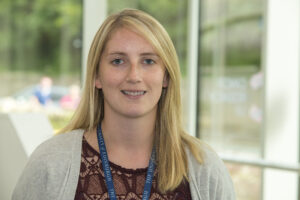
Name: Dr Amy Findlay
School/College: The Roslin Institute, CMVM
Research Area: Genetic causes of sight loss
Role Name: Core Scientist (postdoc)
Webpage/Profile: @Amy_Findlay_PhD
What motivated you to pursue your postdoctoral research?
I’d have to say that I was motivated to pursue my postdoctoral research by having such a positive experience during my honours project during my undergraduate degree. Up until then I had only experienced lab work within group practical sessions, whereby you worked in quite large groups and didn’t really get to experience real lab work. In my fourth year project I worked in a lab which looked at eye development and I was able to better understand how a research project progresses, and I realised that I very much enjoyed lab work. Believing to have missed most application deadlines I panic emailed my course supervisor – when I realised a PhD/research is what I wanted to continue doing – and I felt lucky enough to be selected on a PhD program to continue my research into eye development. The support I received from my course supervisor was priceless, and this support continued through my PhD and afterwards. This is why I am a huge supporter of honours projects and try to take at least one student a year – these are the first real opportunities our students have to work on a lab project and immerse themselves in lab work and without mine, I wouldn’t be where I am today. Watching them develop lab skills and independence through their own project is incredibly rewarding, and some realising that research is so much more than the two hour practical class they’ve had and wanting to continue their journey, just as I did, feels like paying it forward.
What are the benefits of connecting with other postdoctoral researchers?
I think the benefits of connecting with other postdoctoral researchers are really two fold; first having a sounding board to discuss problems and concerns with, especially to people who are potentially in the same position or have been in that position is a great advantage. Job stability, lack of career progression and the juggling of expectations and work load can be a heavy burden and having a core group for support is essential to maintain good mental health.
The second is obviously scientific – these collaborations and networks are great for knowledge exchange, whether that is trouble shooting lab work, or even knowing who you can borrow bits and pieces from when in a pinch. I genuinely think that a lot of research takes a village – and if you are in a smaller lab group, other postdocs become a crucial part of your scientific and social support network.
What do you love about being a postdoc?
I think in terms of job variability a postdoc means that you do not necessarily do the same things day in day out. The independence allowed when investigating your own research project, allowing you to take the initiative when planning the next steps is something not every career allows. Following where results take you can quite often mean learning new techniques, or even developing your own. Sometimes I speak to my friends in office jobs and I think I’m very lucky to have a job that can be so different and interesting.
What do you find most challenging about being a postdoc?
A massively challenging part about being a postdoc is job security. I’m sure I am not the only person that will say this as it’s a common cause of concern and anxiety within my peer group at the University. Short term contracts sometimes do not even last the length of a project. This has both career and personal implications that can be quite difficult to navigate.
How is your PI supporting your development as an independent researcher?
I have only recently moved to my current lab in a short term cover position. However my PI is very supportive of my development as an independent researcher and encourages me to ensure I am using this time to benefit and progress my own career as well as supporting the needs of the lab. This has included allowing me time to attend training to expand my skill set, and giving opportunities to present at conferences whereby I can hopefully make useful contacts for my future.


